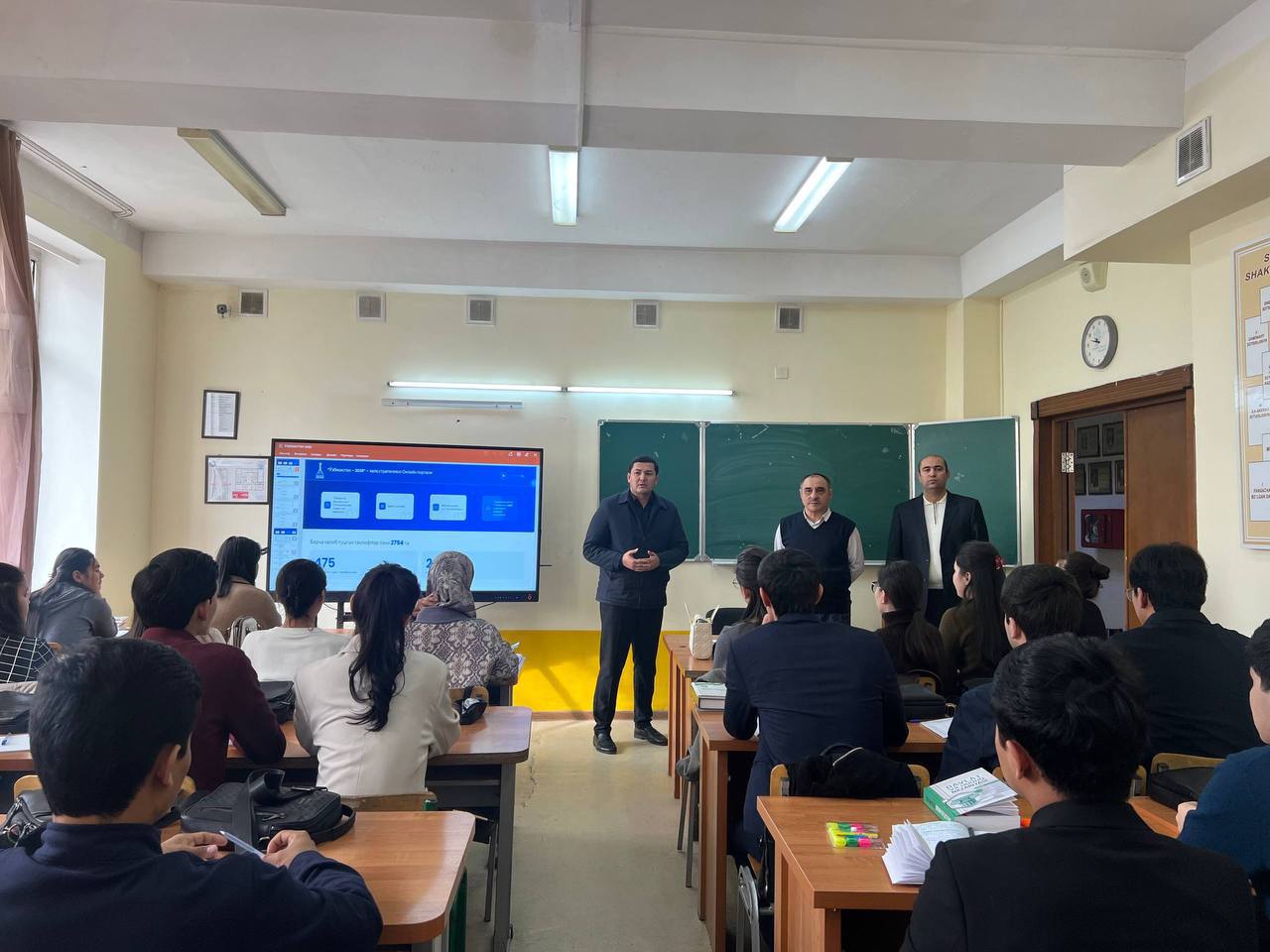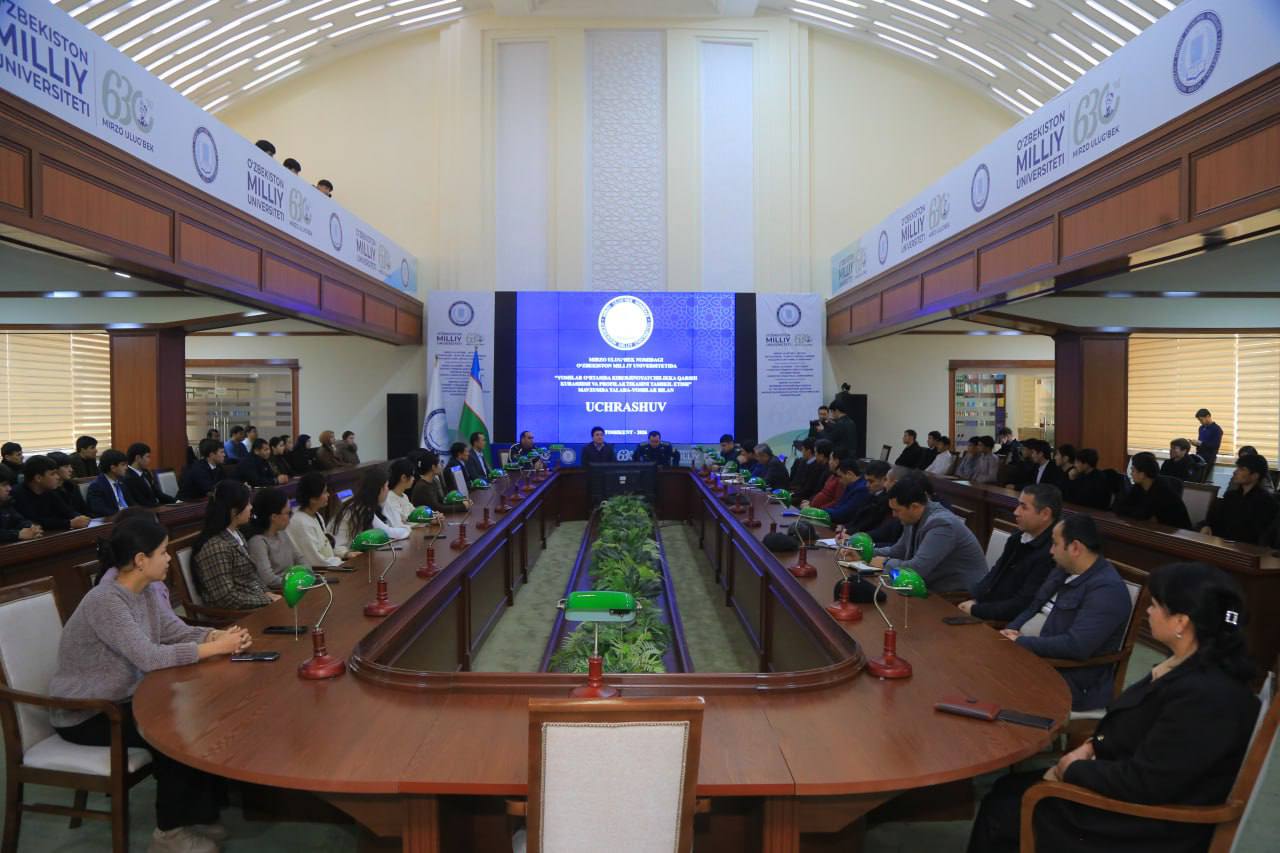
Sherimbetov Vafabay – Head of department
100174, Universitet street 4, Olmazor district, Tashkent
Monday-Friday, 14:00 – 17:00
97 762-29-70
vafo_uz@mail.ru
Department of ” Ecology” – since 1990, the Department of Hydrobiology and Ichthyology was renamed the Department of Ecology and Ichthyology to train environmental specialists.
Scientific subject of the department:
– Scientific substantiation of resistance of plants to drought, industrial waste.
– Study of the ecology of useful medicinal plants and the organization of plant communities in degraded areas.
– Systematic analysis of the structural, functional and biological features of the ecological classification of plants of the adyr and desert regions of Uzbekistan.
– Study of the ecology of hydrobionts in water bodies of Uzbekistan.
– Scientific work on sustainable use of nature, urban ecology, sustainable development .
Employees of the department
| № | Position, academic title, telephone and e-mail address: | |
| 1 | Sherimbetov Vafabay Xalillullayevich Head of the Department Doctor of Philosophy in Biological Sciences (Phd) Tel: +998977622970 E-mail: vafo_uz@mail.ru | |
| 2 | Rahimova Turakhon Uzakovna Professor, Doctor of Biological Sciences Tel: +998935656855 E-mail: t.rahimova@nuu.uz | |
| 3 | Kulmatov Rashid Anvarovich Professor, Doctor of Chemical Sciences Tel: +998 94 577 07 03 E-mail: rashidkulmatov46@gmail.com | |
| 4 | Sherimbetov Sanjar Gulmirzayevich Professor, Doctor of Biological Sciences Tel: 977468642 E-mail: sanjarbeksherimbetov@gmail.com | |
| 5 | Kholmatov Bakhtiyor Rustamovich Professor, Doctor of Biological Sciences Tel: +99871 2890465 E-mail: biol_uz@mail.ru | |
| 6 | Mirzayeva Gulnora Saidaripovna Doctor of Biological Sciences Tel: +998974031066 E-mail: mirzayeva.gulnora@mail.ru | |
| 7 | Allaberdiyev Rustam Xamrayevich Associate Professor, Candidate of Biological Sciences Tel: +998977031066 E-mail: a-rustam@rambler.ru | |
| 8 | Yodgorova Dilfuza Shavkatovna Associate Professor, Candidate of Biological Sciences Tel: +998 94 678 55 03 dilfuzayodgorova13@gmail.com | |
| 9 | Xalillayev Sherzod Alimbayevich Acting Associate Professor, Doctor of Philosophy in Biological Sciences (PhD) Tel: +998 97 784 28 14 E-mail: sherzod85-85@mail.ru | |
| 10 | Jabborov Bahrom Turgunovich Acting Associate Professor, Doctor of Philosophy in Biological Sciences (PhD) Tel: +998911928692 Email: jabbarov@gmail.com | |
| 11 | Eshonkulov Otabek Donyorovich Head teacher Tel: +998330350145 E-mail: otabekeshonqulov80@mail.ru | |
| 12 | Mirzayev Jasur Ashiraliyevich Senior Lecturer, Doctor of Philosophy in Biological Sciences (PhD) Tel: +998900066044 E-mail: jasur_mirza86@mail.ru | |
| 13 | Kochkarob Nurbek Yuldashevich Lecturer, Doctor of Philosophy in Biological Sciences (PhD) Tel: +998998208581 E-mail: quchkorov1981@mail.ru | |
| 14 | Khurramov Nodir Norboy oglu Teacher Tel: +998338766962 E-mail: xurramov92@mail.ru | |
| 15 | Rajabova Nilufar Davlatboy qizi Trainee teacher Tel: +998 93 203 75 32 |
Subjects taught
| № | The name of the science | Brief information about science |
| 1 | Basics of ecology | To teach students the impact of environmental factors on living organisms, organisms in the community, the general laws of their interaction with the external environment, the structure and dynamics of communities, the laws and principles governing the life of ecosystems |
| 2 | Biogeography | To teach students the theoretical foundations, basic concepts and laws of biogeographic knowledge, the biological and ecological role of organisms in the geographical crust and its various territorial units, to teach the principles of distribution and habitat of organisms on the basis of general geographical laws and to apply them in practice. . |
| 3 | Bioecology (plant ecology) | The science of bioecology (plant ecology) is the classification of environmental factors, their impact on plants, the problems of this science, the relationships between the environment surrounding the plant world, the impact of various environmental factors on plants and their adaptations , scientific and practical research on the impact of anthropogenic factors on them and their adaptations, plant protection, their classification in the Red Book species, adaptation of plants to drought, salinity, heat and other environmental factors focuses on the formation and development of niches. |
| 4 | Soil and agroecology | Students will learn the subject, goals and objectives of soil and agroecology, scientific basis, history of development, main sections, interaction with other disciplines; The role of science in solving modern problems in agriculture, the formation of cultural agro-landscapes as a result of human activities in the soil and the formation of ecological relations between agrocenoses by applying the achievements of aronomic science in agriculture to get acquainted with, thereby developing the ability to apply them in practice. |
| 5 | Bioecology (animal ecology) | The science of bioecology (animal ecology) is the classification of ecological factors, their impact on animals, the problems of this science, the relationships between the environment of the animal world, the impact of various environmental factors on animals and their adaptations, the impact of anthropogenic factors on them and it focuses on the formation and development of scientific and practical skills on adaptations, animal protection, red-listed species, their classification, adaptation of animals to drought, salinity, heat and other environmental factors. |
| 6 | Social ecology | Social ecology teaches the legal regulation of social relations and ecologically sustainable development, the legal regulation of social relations between nature and society, which occurs in the process of environmental protection, rational use of natural resources and the restoration of degraded natural complexes. |
| 7 | Modern environmental problems | Science is the theoretical basis of modern environmental problems, the basic concepts and laws, the current state of human impact on nature, the causes of today’s scientific and technological revolution and global environmental crises, as well as the application of knowledge on nature protection, the current environmental crisis, local negative environmental consequences , teaches the laws of climate change, potential environmental hazards, environmental legislation, the theoretical foundations of environmental problems. |
| 8 | Food and biosafety | The science of food and biosafety includes a healthy human lifestyle, the role of ecologically natural food products, their chemical composition, biological safety measures in the cultivation of agricultural products and the importance of using modern methods to ensure biological safety. Provides information on ecological, biotechnological and microbiological characteristics, methods of food production, monitoring of food quality and ensuring biological safety in the production process. |
| 9 | Environmental policy | Environmental policy science Introduction to the current environmental policy in Uzbekistan, the content of rational use and protection of nature, the reflection of environmental law, the study of environmental law in the development of environmental awareness and culture of the local population, tactical plans and strategic programs and acquaintance with plans, disclosure of theoretical bases of ecological policy; teaches the mechanism of interpretation and legal disclosure of the content of the system of ecological legislation, the formation of ecological-legal worldview and culture, the application of environmental legislation in practice. |
| 10 | Climate change and environmental adaptation | Science of Climate Change and Ecological Adaptation Scientific and theoretical bases of climate and climate change, ecological problems related to climate and their causes, their change in space and time, ecological assessment, nature conservation and the ecological foundations of the rational use of natural resources. |
| 11 | Ecomonitoring and ecoexpertise | Ecomonitoring and eco-expertise Types and levels of eco-monitoring and eco-expertise, organization and conduct of environmental expertise of natural environment and ecosystem monitoring system, basics of biological monitoring, monitoring of biosphere reserves, new adopted and existing equipment and technologies; waste inventory; environmental impact assessment of the enterprise; teaches methods of selection and justification of options for nature protection measures, calculation of the maximum allowable amount of waste, disposal and utilization of industrial waste. |
| 12 | Urban and industrial ecology | Science to give a general idea of urban and industrial ecology, ecological design of dwellings, ecological monitoring of cities, study of the urbanization process and its consequences; improving the ecological condition of urban air; access to clean drinking water, industrial waste and their recycling; teaches industrial cities to ensure environmentally sustainable development. |
| 13 | Garbology and ecotaxicology | The science of garbology and ecotaxicology is the search for safe methods of waste disposal, detection of harmful substances that require special treatment, waste, finding reliable information about the composition of waste and ways to eliminate it, angropogenic changes in the environment Basics of theoretical and practical assessment of the use of environmental, social and other wastes to ensure sustainable urban development, environmental safety, development and improvement of waste disposal methods, environmental impact, forecasting and assessment of environmental impact to get acquainted with the introduction of waste processing technologies, toxicity and risk detection (quantity and quality relations), prevention of hazardous situations, development of measures to restore ecosystems, the relationship between environmental factors and systems, preserving the place and gene pool of man in the biosphere teaches issues. |
| 14 | Methods of teaching ecology | Methods of teaching ecological sciences The history and scientific bases of science, methods and means of ecological education as a future teacher, new pedagogical technologies that can be used in the educational process, as well as interactive methods, ecological to be able to apply teaching in practice, to provide independent knowledge; With the peculiarities of working with curricula, textbooks, manuals created on the basis of SST and their practical implementation, the organization of teaching environmental sciences in schools, lyceums and secondary special vocational institutions provides scientific knowledge, practical training and skills on introduction, teaching methods, application of tools. |
| 15 | Rational use of natural resources and alternative energy | The science of rational use of natural resources and alternative energy provides students with theoretical foundations and practical issues of rational use of natural resources, as well as the provision and improvement of the necessary human environment, alternative energy sources and sources, ecologically clean and renewable. provides scientific and practical knowledge and skills on the use of energy resources. |


